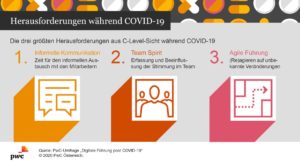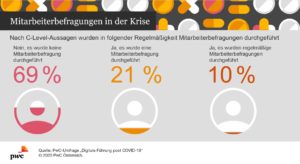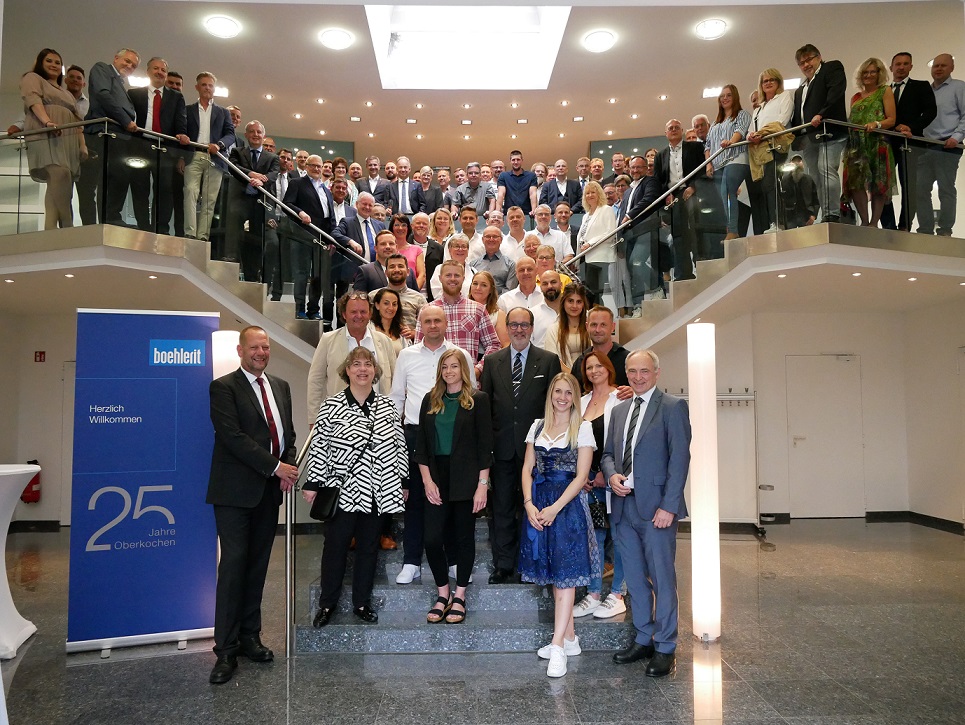- 87% of Austrian senior managers have changed their leadership style due to COVID-19
- 70% would like to offer their staff more flexible working patterns from now onwards – it is likely that working from home will become more common when the crisis is over
- Half of all senior managers surveyed want to improve their own digital skills
- Employee participation still needs to be improved: only 10 per cent regularly carried out employee surveys during the crisis
- The main challenges of remote working are informal communication, team cohesion and agility
COVID-19 has fundamentally changed the world of work, resulting in major changes to the responsibilities, priorities and challenges facing Austrian senior managers. The latest PwC survey ‘Digital leadership post-COVID-19’ has highlighted specific ways in which the crisis has influenced the leadership style of senior managers in Austria and has identified future challenges and positive changes that Austrian executives want to uphold in the post-pandemic future.
“The crisis has shown us that other ways of working can be possible – in other words, a world in which remote working is the norm. It is becoming increasingly clear that we cannot return to the pre-COVID-19 world of work and that the solution lies in finding some kind of new normality,” explains Olivia Stiedl, Senior Manager People and Organisation at PwC Austria.

COVID-19 as a catalyst for digital transformation: C-level executives focus on digital leadership
87% of senior managers surveyed stated that they have changed their leadership style as a result of COVID-19. 93% believe that digital leadership should be taken into account in the future. Now that remote working has proven to be so much of a success, many managers want to harness these new opportunities to save costs and improve business performance. 70% of the senior managers surveyed would like to continue offering more flexible working hours as well as use even more types of co-working tools. It is expected that remote working will increase by around 22% after the crisis is over. Video calls are also going to be part of the ‘new normal’: the survey revealed that over 80% of respondents believe they have the potential to reduce meetings and business travel in the future.

Team cohesion under threat
Whilst the technical issues involved in setting up remote working usually only present temporary problems for most companies, it is likely that maintaining positive team relationships and managing informal communication when working from home are going to continue to be a challenge for some time to come. Olivia Stiedl believes these challenges can be overcome, “Teams that are used to working in the office every day need to find new ways to interact with each other in an informal way. For example, it is a good idea to schedule regular virtual team coffee breaks.”
Employee participation declines during the crisis, with very few employee surveys carried out
Only 10% of the managers surveyed stated that they had carried out regular employee surveys during the COVID-19 crisis. 21% had carried out at least one survey, whilst 69% had not issued any at all.

“It is especially important during times of uncertainty for employers to communicate a sense of stability, authenticity and commitment. Working in separate locations has made it much harder than before to deal with your team’s concerns, fears and requirements. An employee survey is therefore a simple but useful way to include employees in future management decisions. It also provides you with good insights into the current mood amongst the team and helps to highlight problem areas,” Olivia Stiedl continues. “In order to meet employee needs as we enter this new normal, managers need to become more agile and have greater confidence in adaptive and participative management techniques.”
Upskilling starts with C-level employees
The survey also showed that half of the managers surveyed would like to develop their own digital skills. A further 53% recognised that they also need to provide employee training on new technical solutions as part of a drive to enhance digital skills.
“63% of the senior managers surveyed would also like their staff to work more independently. This sort of behaviour needs to be recognised, developed, taught and lived out in practice. The challenges that have arisen for the first time as a result of the crisis can be tackled through targeted training at all levels, which will enable everyone to work together to develop suitable solutions that support collaborative working,” explains Olivia Stiedl.






